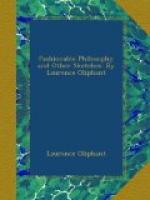“The Sisters of Thibet,” writes Ushas, of course with an astral pen in astral ink, “owe their origin to a circumstance which occurred in the time of Sankaracharya, erroneously supposed by the initiated to be an incarnation of Buddha. This teacher, who lived more than a century before the Christian era, dwelt chiefly upon the necessity of pursuing gnyanam in order to obtain moksha—that is to say, the importance of secret knowledge to spiritual progress, and the consummation thereof. And he even went so far as to maintain that a man ought to keep all such knowledge secret from his wife. Now the wife of Sankaracharya, whose name was Nandana, ‘she who rejoices,’ was a woman of very profound occult attainments; and when she found that her husband was acquiring knowledges which he did not impart to her, she did not upbraid him, but laboured all the more strenuously in her own sphere of esoteric science, and she even discovered that all esoteric science had a twofold element in it—masculine and feminine—and that all discoveries of occult mysteries engaged in by man alone, were, so to speak, lop-sided, and therefore valueless. So she conveyed herself secretly, by processes familiar to her, away from her husband, and took refuge in this region of Thibet in which we now dwell, and which, with all his knowledges, Sankaracharya was never able to discover, for they were all subjective, and dealt not with the material things of this world. And she associated herself here in the pursuit of knowledge with a learned man called Svasar, ’he who is friendly,’ who considered secret knowledge merely the means to an end, and even spiritual progress valuable only in so far as it could be used to help others; and they studied deep mysteries as brother and sister together—and he had been a mahatma or rishi of the highest grade—and, owing to the aid he derived from his female associate, he discovered that the subjective conditions of nirvana and devachan were the result of one-sided male imaginings which had their origin in male selfishness; and this conviction grew in him in the degree in which the Parthivi Mutar, or ‘Earth Mother,’ became incarnated in Nandana. Thus was revealed to him the astounding fact that the whole system of the occult adepts had originated in the natural brains of men who had given themselves up to egotistical transcendental speculation—in fact, I cannot better describe the process than in the words of Mr Sinnett himself, where he alludes to ’the highly cultivated devotees to be met with occasionally in India, who build up a conception of nature, the universe and God, entirely on a metaphysical basis, and who have evolved their systems by sheer force of transcendental thinking—who will take some established system of philosophy as its groundwork, and amplify on this to an extent which only an oriental metaphysician could dream of.’




